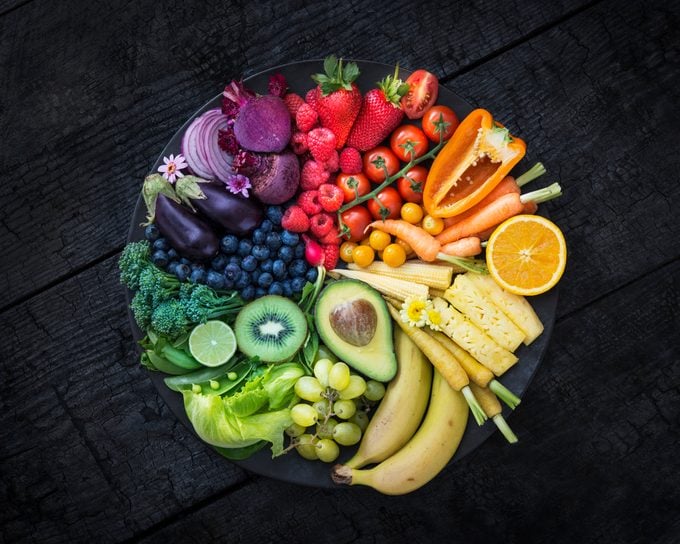What Is Water Fasting? What Health Experts Need You to Know
Updated: Dec. 04, 2020
Water fasting, by definition, only includes water. Here's what you need to know about its potential health benefits and risks.
Understanding water fasting
Fueled by the popularity of intermittent fasting, water-only fasting seems to be making a comeback. Water-only fasting is defined as complete abstinence of any food or other liquids except for water.
Generally, these fasts last from 24 to 72 hours, but experts are quick to caution that water fasting can have risks and aren’t for everyone—particularly those with certain health conditions. While some research suggests that these type of fasts might have some health benefits too, proper medical supervision is a good idea.
People may decide to do a fast for a number of reasons, including weight loss, other potential health benefits, or possibly for religious or spiritual reasons. (Fun fact: dry fasting is modeled after several religious fasting practices.)
If you are very healthy and work with a health care provider who is well versed in fasting, water-only fasts may be safe for three days or so, says Robin Foroutan, RD, integrative medicine dietitian at Morrison Center in New York City and spokesperson for the Academy of Nutrition and Dietetics.
But, she cautions, this type of fast is not recommended for someone who is taking multiple medications, has disordered eating, or certain underlying health conditions.
Here’s what you should know about the potential risk and benefits of water fasts.
Risks of water fasts
Fasting, in general, may cause headaches or low blood sugar, says Foroutan. Symptoms of low blood sugar may include shakiness, nervousness, anxiety, chills, and sweating.
“It can also cause fainting and there have been documented cases of electrolyte imbalances,” says Foroutan. This can result in fatigue, headaches, and other symptoms.
In a 2018 study, published in BMC Complementary and Alternative Medicine and conducted at TrueNorth Health Center, researchers reviewed electronic medical charts for 768 water fasts that lasted for at least two consecutive days and included a structured “refeeding” plan.
The findings revealed that most side effects were mild, namely nausea, headache, insomnia, back pain, indigestion, and fatigue. There were two serious events that required hospitalization.
Decades ago, water-only fasting was considered for weight loss, but it fell out of favor largely because there wasn’t enough medical supervision, explains Foroutan. As a result, serious complications occurred, including death.
At the time, these fasts were arbitrary and sometimes lasted for longer periods of time. People also didn’t stop fasting when a complication occurred and didn’t start eating again gradually.
All of these factors can increase the risks of water fasting. In addition, people weren’t always screened for underlying conditions that could affect fasting outcomes.
Water fasting can cause dangerous nutrient imbalances and extremely low blood sugar; that’s why medical experts recommend against fasting if you have:
- Gout
- Diabetes
- Are pregnant
- An eating disorder
They are also not recommended for older people or for children.
Water fasting and weight loss
You will lose weight if you only drink water and don’t eat, says Scott Kahan, MD, director of the National Center for Weight and Wellness in Washington, D.C. This tends to be just water weight though, and it will come back when you start eating food again, he says.
But weight loss can be long-lasting for some water faster, adds Alan Goldhamer, founder of TrueNorth Health Center, a facility in Santa Rosa, California, that offers in-patient water fasting. “If you continue to eat a plant-based diet with no salt, oil, or sugar, weight loss will continue after a prolonged water fast, but at a slower rate,” he says. “Men lose about three pounds a week and females lose about two pounds a week after a water fast is complete.” People tend to lose one pound a day when they are actively fasting, he says.
That said, most health experts advise that people avoid fad diets or rapid weight loss with things like fasting because they are unlikely to be sustainable or lead to healthy, long-term weight loss.
Water fasts may have other health benefits
A 2016 study published in BMC Cancer suggests that water fasting about 72 hours before chemotherapy to treat cancer may reduce some of the side effects by protecting normal cells from harm. There is some research that points to benefits associated with high blood pressure, diabetes, epilepsy, and other diseases, Goldhamer notes.
Fasting may also stimulate autophagy, a process that helps your body break down and recycle old parts of your cells.
“This is a deep clean-up,” says Foroutan. “Your body gets rid of the bits of cells and cells that are not working optimally and then makes new cells. It is truly anti-aging at the most basic cellular level.”
Water fasting protocols
Leading up to a fast, it may help to prepare your body by eating smaller portions and healthier foods, says Goldhamer.
He suggests that people eat only whole plant-based foods as the fast gets closer. Just two days before he counsels them to only consume fresh fruits and vegetables.
“They can be raw or cooked and you can eat as much as you want but that’s it,” Goldhamer says. It’s also important to eliminate caffeine before a fast as caffeine withdrawal can make you feel worse, he says.
Once the fast is over, drink juice and gradually reintroduce solid plant-based foods with no added sugar, oil, and salt, Goldhamer says. This “refeeding” process should also be monitored by a medical professional.
“You don’t necessarily have to be in a medical facility to try a short-term water fast, but you should be working with someone who is well versed in fasting,” Foroutan says. “The key here is [to be] medically supervised.”
Make sure to drink enough water and avoid exercise
By definition, water fasts only include water. Because you consume water in the food you eat, you may need to drink more water than you usually do to avoid dehydration.
At TrueNorth Health Center, water fasters consume a minimum of 40 ounces of distilled water each day, says Goldhamer.
Exercise is an important part of a healthy lifestyle and can help you maintain a normal weight and stave off disease, but you shouldn’t do it on a water fast, says Goldhamer.
A metabolic switch is flipped during a fast, and you start to burn fat instead of glucose or blood sugar for energy. “If you are very active, you will start burning protein and won’t burn as much fat,” he says. “When you rest, you lose a higher percentage of fat.”
Water fasting is not for everyone
At Goldhamer’s facility, water fasters undergo a thorough medical history, exam, and laboratory monitoring before, during, and after their fasts. Keep in mind that water fasting isn’t for everyone, and it’s best to consult your healthcare professional.
Next, here’s what health experts want you to know about fasting.

























